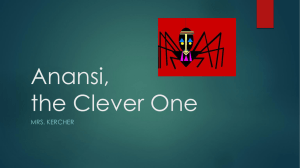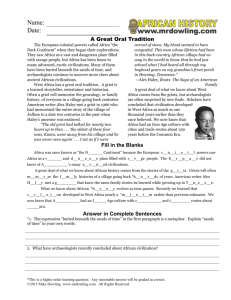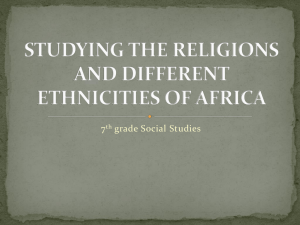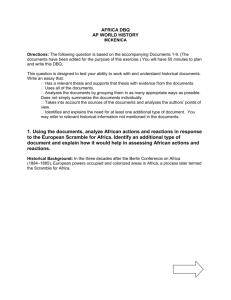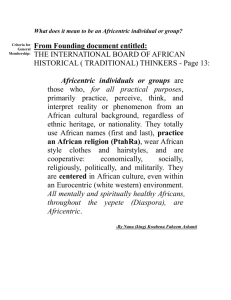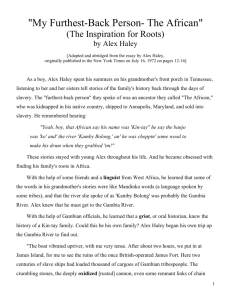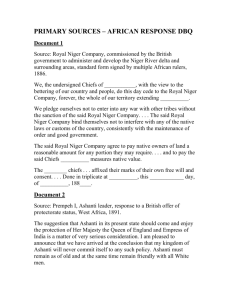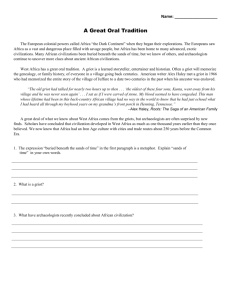West African Culture
advertisement
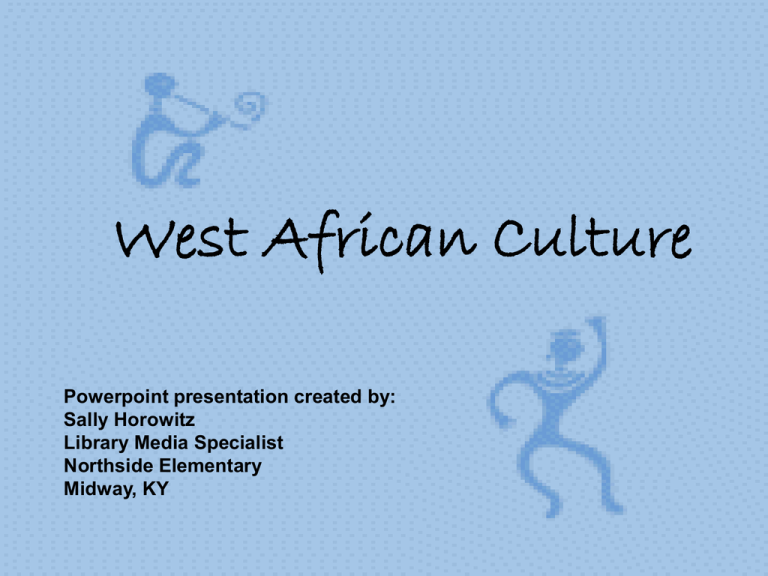
West African Culture Powerpoint presentation created by: Sally Horowitz Library Media Specialist Northside Elementary Midway, KY West African Storytelling • Africans love a good story and a good storyteller. They are primarily an oral people (their stories are not written down, but told verbally), and are often created to be performed with music and dance. • Histories and stories of a people that come to us in a spoken and sung form are part of what is called an oral tradition. Oral tradition means that the stories are told rather than written down. • Because people hold the oral tradition in their memory, sometimes the story changes with the telling. Have you ever played telephone? African Storytelling • A great deal of what we know about West Africa comes from the griots (storytellers), but archaeologists are often surprised by new finds. In the last twenty-five years, scholars have concluded that civilization developed in West Africa as much as one thousand years earlier than expected. We now know that Africa had an Iron Age culture with cities and trade routes about 250 years Before the Common Era. Griot (storyteller) Who is Ananse? • Ananse (also spelled Anansi) is one of the most popular characters in West African storytelling. • He is a trickster. Trickster tales use animal characters with human features to help us understand human nature. Where is West Africa? • West Africa is the region of western Africa that includes the countries of Benin, Burkina Faso, Cameroon, Côte d'Ivoire, The Gambia, Ghana, Guinea, GuineaBissau, Liberia, Mali, Niger, Nigeria, Senegal, Sierra Leone and Togo. • It is on what is known as the “Bulge of Africa.” Regional Overview West Africa Habitats Government in West Africa Population Density: Darker = Denser African People and Culture • There are many different people and tribes in western Africa - with their culture varying from tribe to tribe. We are going to learn about two groups: The Mandinka and the Ashanti people. Who are the Mandinka? • The Mandinka are an ethnic group that live in West Africa, primarily Senegal, Gambia, and Guinea-Bissau. • Most Mandinka are farmers. • Mandinka have a rich oral history that is passed down through praise singers or griots. Mandinka People Traditional Mandinka Housing What is a Griot? • A griot is a West African storyteller-musician. A griot doesn’t just tell stories. They typically accompany themselves on a stringed instrument. They still play an important role today—to tell people about the past, to keep their history alive, and to safeguard their traditional culture. They sing the history of a tribe or family at weddings, naming ceremonies, and other social and religious occasions. (you were listening to a griot playing and singing) Some Griot instruments • A kora is made from a calabash, (a fruit like a watermelon) that has been cut in half. The front is made of cowskin. A traditional kora has 21 strings, made of fishing line. The strings are plucked by the thumb and forefinger of each hand. • A balaphone is similar to a xylophone, with 17-21 wooden slats that are played with two mallets. Balaphone African Drums • Drums are used for sending messages to the people in town, for ceremonies such as weddings or naming ceremonies, and even for healing sick people. • There are many different kinds of drums. Here is an example of a djembe from Mali: Who are the Ashanti people? • The Ashanti live in central Ghana in western Africa. They are the largest tribe in Ghana. • In each village, the Chief and Elders maintain traditional customs and ceremonies and deal with disputes. • The Ashanti religion is a mixture of spiritual and supernatural powers. They believe that plants, animals, and trees have souls. Does that remind you of any other culture? • The Ashanti are known for their gold and metal crafts, woodcarving, and brightly colored woven cloth called kente. An Ashanti ceremony Ashanti people Traditional Ashanti Housing Why do people tell stories? • Every human culture in the world has created stories as a way of making sense of the world. –Sharing the human experience - to express or communicate emotion, feelings, ideas, and information. –Passing on tradition and culture - (e.g., storytelling, folktales, myths and legends) –Recreational drama for entertainment What are some popular forms of telling stories in our culture today? • • • • • • • Books Movies Television shows Plays Broadway musicals YouTube videos Magazines Bibliography • • • • • • • • • Background downloaded from: Backgrounds Etc. http://www.geocities.com/Heartland/Ranch/4842/africa.html An introduction by Professor Cora Agatucci to the nature of storytelling in Africa: http://web.cocc.edu/cagatucci/classes/hum211/afrstory.htm Map and article on West Africa from Wikipedia free encyclopedia http://en.wikipedia.org/wiki/West_Africa African and African-American Folktales. United Learning (1993). Retrieved February 26, 2007, from Unitedstreaming: http://www.unitedstreaming.com Anansi image: http://www.anansi.org/webwalker/intro.html Regional overview of West Africa: World Geography: Africa. Discovery Channel School (2004). Retrieved February 26, 2007, from Unitedstreaming: http://www.unitedstreaming.com Information about the Ashanti and Mandinka people: http://www.ashanti.com.au/ http://www.africaguide.com/culture/tribes/ashanti.htm http://www.globalvolunteers.org/1main/ghana/ghanapeople.htm http://www.pbs.org/wonders/Episodes/Epi3/3_wondr1.htm http://www.si.umich.edu/CHICO/UMS/Drummers/oraltradition.html Gambian Griot School of Music and Dance http://home.planet.nl/~verka067/African_griot.html Example of Griot singing: http://www.library.csi.cuny.edu/dept/history/lavender/griotimages.html
